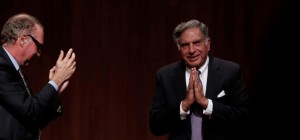Tata, the architect who built an empire
Ratan Tata honoured with a doctorate at NSWU by Vice – Chancellor Prof Hilmer
By Vijay Badhwar
From an architect to a doctor, it has been a celebrated journey of India’s most respected businessman, Ratan Naval Tata, who was honoured in an especially held convocation at the University of NSW on November 27.
John Clancey Auditorium overflowed with admirers as the Vice-Chancellor, Prof Frederick Hilmer, read the citation in praise of Ratan Tata, Chairman of India’s largest and most diversified corporation, and honoured him with a Doctorate of Business.
“Ratan Tata is acknowledged widely as a brilliant businessman, both in India and internationally, a driving force behind the resurgence of India as an economic and world power, a philanthropist with a social conscience and a passionate advocate for advances in technology, innovation and higher education,” Prof Hilmer said.
Mr Tata later articulated his journey from a budding architect from Cornell University in US to the helm of the largest corporation in India in a tripartite discussion with Chancellor David Gonski and Prof Hilmer.
He had no intention of leaving architecture as a profession but had to give in to his grandmother’s persuasion to return, “but that was after leaving for US three times as business wasn’t my favourite job”, Mr Tata said.
He was influenced by JRD Tata, as he also loved aviation, Mr Bose in US with whom he shared many business philosophies and Chairman of Cummins Engine, Henry Schacht, who was an important mentor, Ratan Tata said.
Reflecting on his early years, Mr Tata said that the Tata business he inherited was a disparate group with different names and logos, a sort of a loose confederation. His first task was “to hire a corporate designer for a common logo, write a contractual bond between the various companies and to set a code of conduct we would operate upon”.
When asked how many companies were involved, Mr Tata said it was close to 80 companies which increased to nearly 300 on close count.
Mr Tata emphasised that the code of conduct was the most important heritage the Group had, especially in the context of slowly deteriorating values in India, “otherwise we’d be just another company”, he said.
Ratan Tata believes that ”˜bringing in quotas’ was a forced measure to dispel inequality. “Quotas have a certain negativity,” he said.
He said leading the Tata Group through difficult times, from a conservative group to a growth-oriented corporation without sacrificing values, although difficult, he’d consider as a legacy.
Mr Tata considered Australia as an advanced economy with high technology on its forefront. Having spent seven months in Australia in the 60’s, he spoke from his own experience that India could benefit from Australian products, and Australia, too, he quipped, as India produced one Australia every year. “It’ll be terrific to see Australian companies in the 350 million-strong Indian market,” he said.
There were a number of questions from the overawed audience, especially about the acquisition of Jaguar Land Rover and turning it successfully around. But Mr Tata humbly attributed the success to a change in market conditions.
To improve India-Australia relations, Mr Tata recommended: a free trade agreement, exchange of students between the two countries, internships and building more familiarity at citizen’s level.
Short URL: https://indiandownunder.com.au/?p=1997

